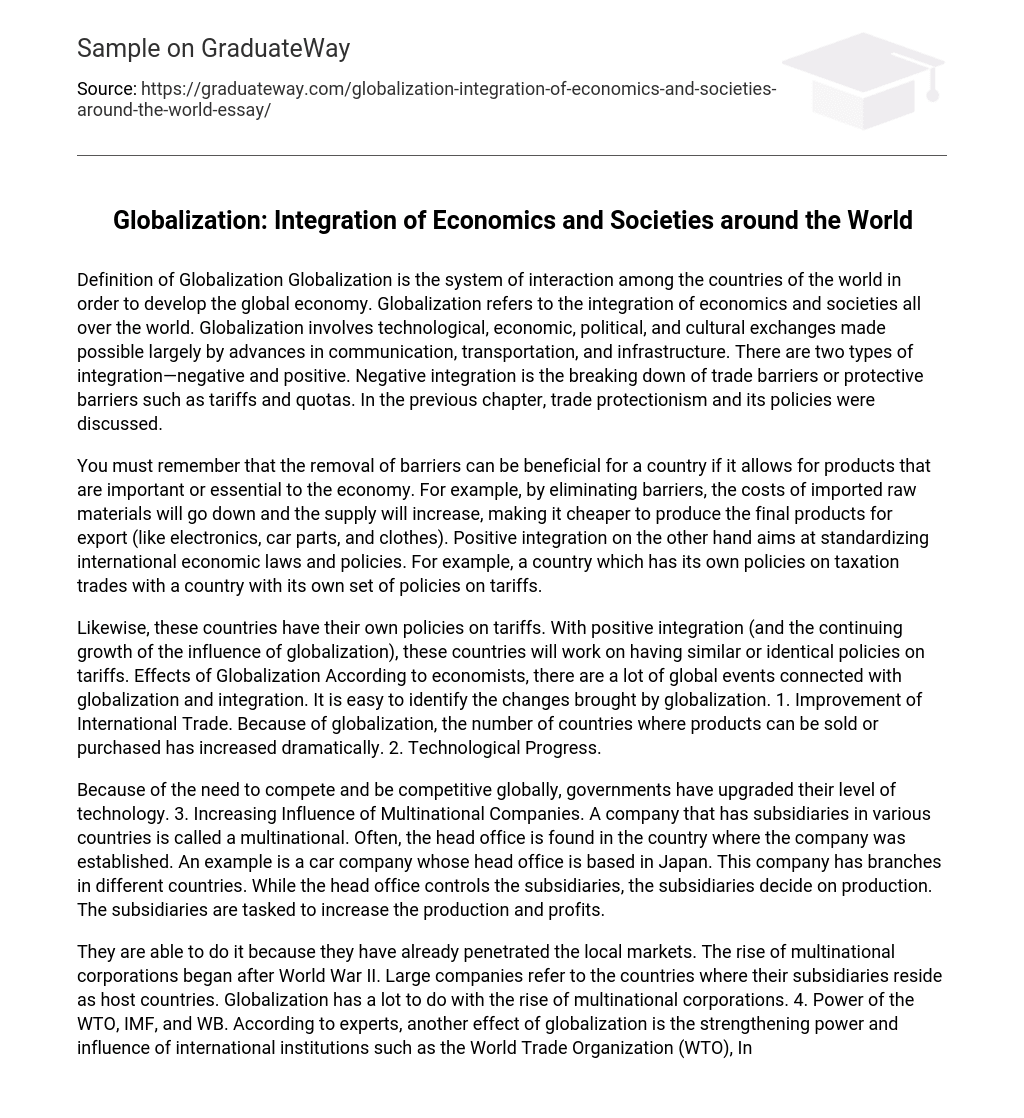Definition of Globalization Globalization is the system of interaction among the countries of the world in order to develop the global economy. Globalization refers to the integration of economics and societies all over the world. Globalization involves technological, economic, political, and cultural exchanges made possible largely by advances in communication, transportation, and infrastructure. There are two types of integration—negative and positive. Negative integration is the breaking down of trade barriers or protective barriers such as tariffs and quotas. In the previous chapter, trade protectionism and its policies were discussed.
You must remember that the removal of barriers can be beneficial for a country if it allows for products that are important or essential to the economy. For example, by eliminating barriers, the costs of imported raw materials will go down and the supply will increase, making it cheaper to produce the final products for export (like electronics, car parts, and clothes). Positive integration on the other hand aims at standardizing international economic laws and policies. For example, a country which has its own policies on taxation trades with a country with its own set of policies on tariffs.
Likewise, these countries have their own policies on tariffs. With positive integration (and the continuing growth of the influence of globalization), these countries will work on having similar or identical policies on tariffs. Effects of Globalization According to economists, there are a lot of global events connected with globalization and integration. It is easy to identify the changes brought by globalization. 1. Improvement of International Trade. Because of globalization, the number of countries where products can be sold or purchased has increased dramatically. 2. Technological Progress.
Because of the need to compete and be competitive globally, governments have upgraded their level of technology. 3. Increasing Influence of Multinational Companies. A company that has subsidiaries in various countries is called a multinational. Often, the head office is found in the country where the company was established. An example is a car company whose head office is based in Japan. This company has branches in different countries. While the head office controls the subsidiaries, the subsidiaries decide on production. The subsidiaries are tasked to increase the production and profits.
They are able to do it because they have already penetrated the local markets. The rise of multinational corporations began after World War II. Large companies refer to the countries where their subsidiaries reside as host countries. Globalization has a lot to do with the rise of multinational corporations. 4. Power of the WTO, IMF, and WB. According to experts, another effect of globalization is the strengthening power and influence of international institutions such as the World Trade Organization (WTO), International Monetary Fund (IMF), and World Bank (WB). 5. Greater Mobility of Human Resources across Countries.
Globalization allows countries to source their manpower in countries with cheap labor. For instance, the manpower shortages in Taiwan, South Korea, and Malaysia provide opportunities for labor exporting countries such as the Philippines to bring their human resources to those countries for employment. 6. Greater Outsourcing of Business Processes to Other Countries. China, India, and the Philippines are tremendously benefiting from this trend of global business outsourcing. Global companies in the US and Europe take advantage of the cheaper labor and highly-skilled workers that countries like India and the Philippines can offer 7.
Civil Society. An important trend in globalization is the increasing influence and broadening scope of the global civil society. Civil society often refers to NGOs (nongovernment organizations). There are institutions in a country that are established and run by citizens. The family, being an institution, is part of the society. In globalization, global civil society refers to organizations that advocate certain issue or cause. There are NGOs that support women’s rights and there are those that promote environment preservation.
These organizations don’t work to counter government policies, but rather to establish policies that are beneficial to all. Both the government and NGOs have the same goal of serving the people. The spread of globalization led to greater influence of NGOs especially in areas of great concern like human rights, the environment, children, and workers. Together with the growing influence of NGOs is the increasing power of multinational corporations. If the trend continues, globalization will pave the way for the realization of the full potential of these two important global actors.





